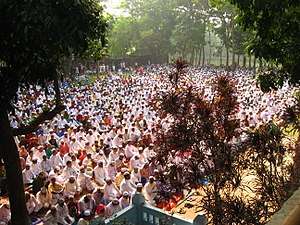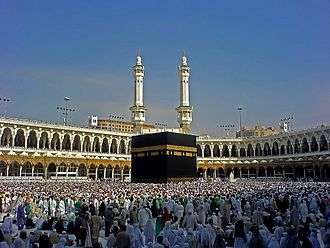Eid prayers
Eid prayers, also known as Salat al-Eid (Arabic: صلاة العيد) and Șālat al-’Īdayn (Arabic: صلاة العيدين "Prayer of the Two Eids"), is the special prayers offered to commemorate two Islamic festivals traditionally in an open space allocated (musalla or Eidgah) or field available for prayer. The two festivals on which these prayers are conducted in large congregations are:
- Eid al-Fitr (Arabic: عيد الفطر), celebrated on the first day of the Islamic month of Shawwal after the fasting in the holy month of Ramadan.
- Eid al-Adha (Arabic: عيد الأضحى), celebrated on the tenth day of Dhu al-Hijjah after the Day of Arafah, the main day of the Hajj pilgrimage season.

Name variations
| Region/country | Language | Main |
|---|---|---|
| Arab World | Arabic | صلاة العيد (Ṣalāh al-'Eid) |
| Iran, Afghanistan | Persian | نماز عيد |
| Pakistan, India | Urdu, Hindi, Punjabi | نماز عيد, ईद नमाज़ (Eid namaaz) |
| Turkey, Azerbaijan | Turkish, Azeri | Bayram namazı |
| Balkans | Serbo-Croatian, Bosnian | Bajram-namaz |
| Bangladesh, West Bengal | Bengali | ঈদের নামাজ (Eider namaz) |
| Sweden | Swedish | Eidbön |
| Indonesia | Indonesian, Javanese | Salat Id |
| Malaysia | Bahasa Melayu | Solat Sunat Hari Raya |
| Iraqi Kurdistan | Kurdish Sorani | نوێژی جێژن |
| Tamil Nadu | Tamil | பெருநாள் தொழுகை (Perunal thozhugai) |
Importance
Different scholars interpret the importance of this salat (prayer) differently. Salat al-Eid is Wajib (necessary/mandatory) according to Hanafi scholars, Sunnah al-Mu'kkadah according to Maliki and Shaf'i jurisprudence, and Fard according to Hanbali scholars. Some scholars say it is fard al-ayn and some say it is fard al-kifaya.[1]
Timing
The time for Salat al-Eid begins when the sun reaches approximately three meters above the horizon until it reaches its meridian. It starts when the sun has risen above the height of a spear, and continues until the sun is approaching its zenith. It is recommended to offer it in the forenoon in the early hours after sunrise.[2]
Adhering to the Sunnah, the time for Eid al-Fitr prayer is delayed and Eid al-Adha prayer is hastened, so as to facilitate distribution of Fitrana before the Eid al-Fitr prayer and offer sacrifice after the Eid al-Adha prayer. This has been a proved Sunnah and has been well recorded in Hadith books.
See also
References
- "Ruling on Eid prayers". Islam Question and Answer.
- The Two Eids and their Significance.
